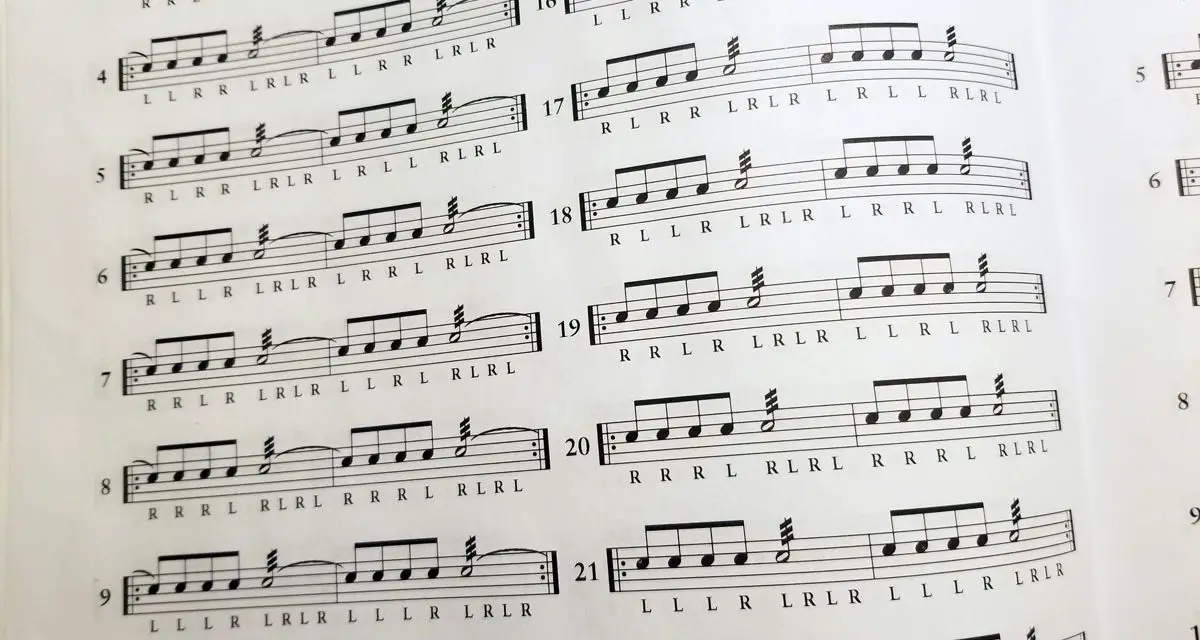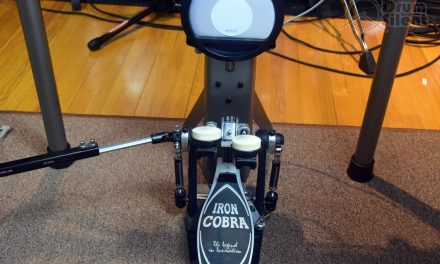The amount of practice you need to reach your goals as a drummer can vary wildly depending on what your goals are. There’s a few ways to look at it, and you might find you don’t need to practice as much as you think if you are feeling intimidated by the time commitment.
How Much Should Beginner Drummers Practice?
If you are just starting out it can be useful to stick to a more regimented and consistent practice plan. It’s also good to potentially break down your practice sessions into smaller chunks of things to focus on while you develop your skills.
Practicing Rudiments
Beginner drummers will benefit a lot from practicing basic rudiments, but this also doesn’t mean that you need to spend hours doing this. To get some consistency going and to develop key muscle memories, 15 minutes a day of practicing rudiments can be enough.
Working through a book such as Stick Control: For the Snare Drummer can be done at a pace of 1 page a day or even less and can give you some focused rudiment practice in shorter chunks of time. Myself, when I’m working on rudiments, I keep this book and a practice pad on my kitchen counter and hit it every day for around 15 minutes a day and see good results.
Getting in that daily practice with rudiments, even if it’s a shorter session, can really help move you along and make you feel a lot more comfortable with handling the drum sticks which will translate to everything else you practice.
Practicing Drumming Techniques Beyond Rudiments
It’s good to find some beats that you want to play, and then start practicing them along with a metronome. Not necessarily full songs, just beats and patterns. This will help you develop a sense of timing as well as some creativity while you explore the beat and work in some fills and variations. Always try to have a few beats or patterns that you tackle each day and try to challenge yourself with increasing harder patterns over time.
15 minutes a day of this is all you need to move forward, but more time is always welcome if you have the time and energy.
Practicing Songs
Of course you’ll want to do more than rudiments and patterns/beats eventually. Once you’re feeling up to it, start playing along with full songs on a drum kit. This will help you learn how to keep up with a live, moving song. It will help you learn how to keep playing through even when you make mistakes, which is a good skill to develop as well.
Even if you struggle at first, find something to play every day or every practice session. Find some songs where you find the drum parts challenging but attainable. Even at lower skill levels you can scale back the parts and find easier ways to play the songs. The idea is to keep challenging yourself with stuff that you can’t play now, but could maybe play in a few weeks if you practice the songs a few times a week.
You can spend another 15 minutes a day here and see results. Playing through a song 2-3 times a day, or multiple songs once a day will help you progress.
So, with all these options, a beginner might be looking at 45 minutes a day. This can be a little intimidating if you have other time commitments, so don’t always feel like you need to practice every day if it stresses you out. Even just hitting rudiments for 10 minutes during an otherwise busy day can be enough to keep progress moving forward. Just practice when able, keep your sessions short and focused, and consistently come back for more and try to push yourself forward.
How Much Should Intermediate or Higher Level Drummers Practice?
This is where it can get a lot more variable and you need to think in terms of your specific goals.
Many intermediate or pro level drummers might have a simple goal of playing one gig a week. And if they know all the songs for that gig, and already have some endurance built up, they might not need to practice much outside of hitting their weekly gig.
The difference is if you are trying to push your skills forward or not. If you’re trying to learn to do things on the drum kit that you just can’t quite pull off yet, or if you’re challenging yourself with harder and faster drum parts, or if you have longer periods of time between live shows, you might prefer a more consistent practice schedule.
It can be valuable for all levels of drummers to keep working on rudiments for 15 minutes a session, most likely as a warm up. Then there might be some challenging new techniques you want to tackle. It can be worth it to hit those for another 15-30 minutes a session. Then there will be the songs that need to be practiced, and this could easily take 30 minutes or more depending on the scope of material you’re working on.
Intermediate to pro drummers can get away with minimal daily practice if they are consistent. An hour a day can be plenty, but it might also not be enough if you are learning new material or preparing for a recording session.
If you play music that requires high levels of endurance and energy, such as death metal, it could be beneficial to practice 3-4 times a week with longer sessions and give yourself some days off to recover, much like going to the gym.
What’s My Routine?
Currently I’d consider myself an intermediate drummer who plays live shows and records from time to time. I like to hit rudiments on the practice pad every day, and I do this at home separately from my practice sessions behind the drum kit at the studio.
I go to the studio about 3 times a week and do longer practice sessions. I’ll spend about 30 minutes practicing newer techniques. An example of this is currently learning to play break beats like the funky drummer. Then I’ll spend another 30 minutes playing through songs for the band I’m in. Then I’ll play another 30 minutes of songs from other artists that I’m learning just for fun and to expand my skills.
So I’m usually practicing about 1.5 hrs three times week on a good week. I find that to be enough to keep my skills polished, to keep learning new stuff, and to keep my endurance levels at an appropriate level for when live shows come up.
Then there’s also the periods of time where I’m busier with work and not as focused on drumming. When that happens I try to at least have one solid session a week where I play for an hour or more, and keep hitting rudiments every other day if possible. This keeps me from slipping backwards and feeling like I need to get caught back up when I get back into a groove of playing more.
How Much Should You Practice?
There’s no definite answer for this. But a good way to look at it is that you should practice often enough that you see improvement over time, even if it’s shorter sessions on a daily basis.
Getting 15 minutes in a day at a minimum is a whole lot better than zero minutes a day. So I’d say at a minimum you should practice for 15 minutes a day. If you are able, try to practice for at least 1 hour a day and mix it up so that you are tackling a few different things during each practice session.
And don’t stress if you miss a day here or there, we all have busy lives. Just keep picking up the sticks and make sure you’re having fun with whatever you’re doing. If you get a good daily streak of practice sessions going, that’s great!












